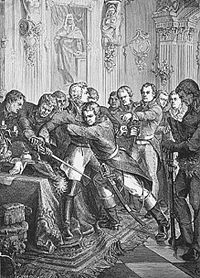Coup of 1809

The Coup of 1809 (Swedish: Statskuppen 1809) also referred to as the Revolution of 1809 (Swedish: Revolutionen 1809) was a Swedish coup d'état 13 March that year by a group of noblemen led by Georg Adlersparre, with support from the Western Army.[1] The coup resulted in the deposition of King Gustav IV Adolf and the introduction of a new Instrument of Government.[2][3] The coup was provoked by the disastrous Finnish War. The leaders of the coup are known in history collectively as 1809 års män ('Men of 1809').
The coup executors dutifully convened a parliament or Riksdag, which met on 1 May, and handed over power to it. The Riksdag declared the king deposed and elected his uncle Charles XIII as the new king and the French Field Marshal Jean Baptiste Bernadotte as his successor.
See also[edit]
References[edit]
- ^ Georg, Count Adlersparre at the Encyclopædia Britannica
- ^ "statskuppen 1809 - Uppslagsverk - NE.se". www.ne.se. Retrieved 2021-05-04.
- ^ Isakson, Börje (2009). Två dygn som förändrade Sverige : 1809 års revolution. Stockholm: Natur & Kultur. Libris 10701773. ISBN 978-91-27-11760-0
Further reading[edit]
- Isakson, Börje (2009). Två dygn som förändrade Sverige : 1809 års revolution. Stockholm: Natur & Kultur. Libris 10701773. ISBN 978-91-27-11760-0
- Isaksson, Anders (2009). Kärlek och krig : revolutionen 1809. Stockholm: Bonnier. Libris 11204680. ISBN 9789100119027
- Jacobson, Magnus (2005). ”Kuppen mot kungen”. Populär historia "2005:10,": sid. 22-23 : färgill.. 1102–0822. ISSN 1102-0822. Libris 10277020
- O'Regan, Christopher (2009). I stormens öga : Gustaf IV Adolfs regeringstid och revolten 1809. Stockholm: Forum. Libris 11204747. ISBN 9789137133539
